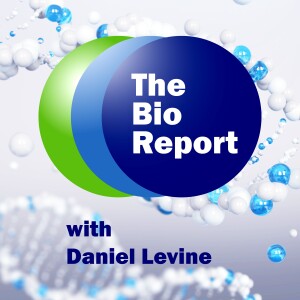
The Bio Report podcast, hosted by award-winning journalist Daniel Levine, focuses on the intersection of biotechnology with business, science, and policy.
The Bio Report podcast, hosted by award-winning journalist Daniel Levine, focuses on the intersection of biotechnology with business, science, and policy.
Episodes

Wednesday Sep 03, 2025
Using Targeted Radiotherapies to Treat Challenging CNS Cancers
Wednesday Sep 03, 2025
Wednesday Sep 03, 2025
Brain tumors are difficult to treat in part because of the blood-brain barrier, the need to protect healthy and sensitive tissue surrounding tumors, and the limits of existing therapies. While there have been great advances in other types of cancer, there’s been relatively little progress in treating these CNS tumors. Plus Therapeutics is developing targeted radiotherapies that provide high doses of radiation directly into the tumor with a catheter. The approach enables the delivery of higher doses of radiation while minimizing exposure to healthy brain cells. We spoke to Marc Hedrick, president and CEO of Plus Therapeutics, about the challenges of treating brain tumors, the limitations of current therapies, and why the company’s targeted radiotherapies have the potential to create better outcomes for patients.

Wednesday Aug 27, 2025
Hitting Previously Undruggable Targets with Oral Therapies
Wednesday Aug 27, 2025
Wednesday Aug 27, 2025
Macrocycles are complex compounds that can interact with targets that are often unreachable with traditional small molecules. Orbis Medicines is addressing the challenge with its nCycles, synthetic macrocycle drugs that are orally available but hit targets that would otherwise require biologic therapies. We spoke to Morten Graugaard, CEO of Orbis Medicines, about its class of synthetic macrocycles called nCycles, its platform technology to generate and screen these therapies, and how they can offer an orally-delivered alternative to biologics.

Wednesday Aug 20, 2025
Building Better Models of Human Diseases to Speed Drug Development
Wednesday Aug 20, 2025
Wednesday Aug 20, 2025
Animal testing for experimental therapies is slow, expensive, and an imperfect predictor for how a drug will act in humans. The Foundation for the National Institutes of Health in July announced a program to advance innovative laboratory technologies that model human biology, enabling faster, less expensive testing. We spoke to Stacey Adam, vice president of scientific partnerships for the FNIH and leader of the public-private partnership, about the new program, the technologies being explored, and what it will take to transform biomedical research with better disease models.

Wednesday Aug 13, 2025
Preventing Opioids from Countering the Benefits of Cancer Immunotherapies
Wednesday Aug 13, 2025
Wednesday Aug 13, 2025
Many cancer patients are prescribed opioids to manage pain associated with their disease, but studies have shown that the use of these pain killers naturally mutes the immune response and can reduce the efficacy of immunotherapies. Glycyx Therapeutics is developing a drug it believes can allow opioids to relieve pain while preventing them from working against immunotherapies. We spoke to Lorin Johnson, chief scientific officer of Glycyx Therapeutics, about the effect of opioids on the immune system, the company’s experimental therapy designed to mitigate the negative effects of opioids in cancer patients being treated with checkpoint inhibitors, and why its drug in development may promote gut health in these patients more broadly.

Wednesday Aug 06, 2025
Better Living through Computational Chemistry
Wednesday Aug 06, 2025
Wednesday Aug 06, 2025
When Takeda in 2023 paid Nimbus Therapeutics $4 billion upfront and the potential for two additional $1 billion milestone payments for its experimental TYK2 inhibitor, the deal was an eye-popping validation of Nimbus’ approach. The company, an early innovator in a computational chemistry, has now integrated AI into its approach to drug discovery. And though it’s been an innovator in technology, it’s also been an innovator in its portfolio approach as an early example of an effective use of a hub-and-spoke business model. We spoke to Abbas Kazimi, CEO of Nimbus, about computational chemistry, how the company’s drug discovery approach has evolved with AI, and how its business model provides liquidity to investors and while making it easier to structure deals.

Wednesday Jul 30, 2025
Outsmarting a Clever One
Wednesday Jul 30, 2025
Wednesday Jul 30, 2025
Despite the successes of immunotherapies to date, about 75 to 80 percent of cancer patients don’t respond to current immunotherapy treatments. Faron Pharmaceuticals is hoping to help change that with its experimental therapy bexmarilimab, which is in development to treat myelodysplastic syndrome. Bexmarilimab targets CLEVER-1, a checkpoint inhibitor found on macrophages, a type of myeloid cell that plays an essential role in the immune system. We spoke to Juho Jalkanen, founder and CEO of Faron, about how the tumor microenvironment can suppress macrophages, how the company’s macrophage checkpoint inhibitor works, and the challenges a Finland-based company faces accessing the capital markets.

Wednesday Jul 23, 2025
The Search for a New Approach to Male Contraception
Wednesday Jul 23, 2025
Wednesday Jul 23, 2025
There’s been a stunning lack of innovation around male contraceptives when it comes to the area of male contraceptives. Men have the choice between a vasectomy, a procedure innovated in the 19th century, or condoms, which date back to at least King Minos in Crete in 3000 BCE. Next Life Sciences is hoping to change that with its Plan A, an experimental hydrogel that is injected into the vas deferens and provides a barrier that prevents sperm from passing. Plan A, which is regulated as a medical device, is expected to be easily reversible. We spoke to Darlene Walley, CEO of Next Life Sciences, about Plan A, the need it is addressing, and why she expects men and women to see it as a welcome alternative to current choices.

Wednesday Jul 16, 2025
Crafting a One-and-Done Epigenetic Editor to Tackle Hepatitis B
Wednesday Jul 16, 2025
Wednesday Jul 16, 2025
There have been great advances in the treatment of hepatitis C with the advent of curative therapies, but hepatitis B has proven far more elusive. That’s due to differences in the way the virus replicates and how it creates a reservoir of viral DNA in the cells in the liver. nChroma Bio, the result of a merger between Chroma Medicine and Nvelop Therapeutics, thinks it has an answer. It’s developing a one-and-done epigenetic editing therapy that silences hepatitis B viral transcription. We spoke to nChroma Bio chief development officer Jenny Marlowe and chief scientific officer Melissa Bonner, about its experimental epigenetic editor for hepatitis B, the merger that brought together the two companies, and how it plans to leverage Chroma’s epigenetic editing platform with Nvelop’s programmable non-viral delivery technologies in future therapies.

Daniel Levine
Daniel Levine is an award-winning business journalist who has reported on the life sciences, economic development, and business policy issues throughout his career. He is founder and principal of Levine Media Group, host of The Bio Report and RARECast podcasts, a senior fellow at the Center for Medicine in the Public Interest, and author of Global Genes’ annual NEXT report on emerging trends in the world of rare disease. From 2011 to 2014, he served as the lead editor and writer of Burrill & Company’s acclaimed annual book on the biotech industry. His work has appeared in numerous national publications including The New York Times, The Industry Standard, and TheStreet.com.
